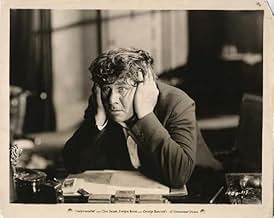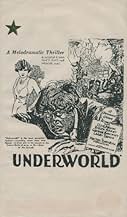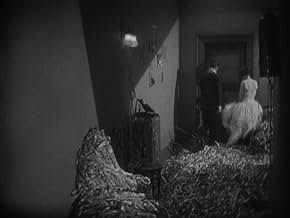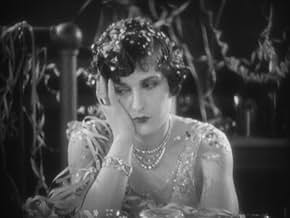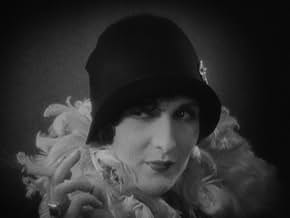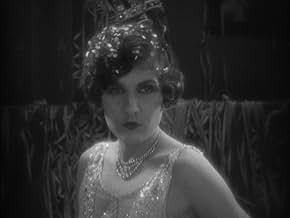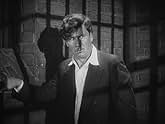ÉVALUATION IMDb
7,5/10
3,6 k
MA NOTE
Ajouter une intrigue dans votre langueBoisterous gangster kingpin Bull Weed rehabilitates his former lawyer from his alcoholic haze, but complications arise when he falls for Weed's girlfriend.Boisterous gangster kingpin Bull Weed rehabilitates his former lawyer from his alcoholic haze, but complications arise when he falls for Weed's girlfriend.Boisterous gangster kingpin Bull Weed rehabilitates his former lawyer from his alcoholic haze, but complications arise when he falls for Weed's girlfriend.
- A remporté 1 oscar
- 5 victoires au total
Alfred Allen
- Judge
- (uncredited)
Shep Houghton
- Street Kid
- (uncredited)
Andy MacLennan
- One of Laughing Faces at the Ball
- (uncredited)
Ida May
- Laughing Woman at the Ball
- (uncredited)
Karl Morse
- 'High Collar' Sam
- (uncredited)
Bob Reeves
- Detective at Railroad Station
- (uncredited)
Julian Rivero
- One of Buck's Henchmen
- (uncredited)
Histoire
Le saviez-vous
- AnecdotesThe film was predicted to be a flop, was shelved by Paramount and eventually released in only one theater in New York. Screenwriter Ben Hecht demanded that his name was taken off the credits. As a result of strong word-of-mouth the movie became an enormous hit and won Hecht the first of his two Academy Awards.
- Citations
'Bull' Weed: -There was something I had to find out - - and that hour was worth more to me than my whole life.
- ConnexionsFeatured in The House That Shadows Built (1931)
Commentaire en vedette
In a way, I suppose this film simply managed to push all the right buttons so far as I was concerned. The basic theme of conflicting love and loyalty is one that has always called to my heart, and the central trio of characters happen to tap into stereotypes of instant appeal: gentle, honourable intellectual - sharp-witted and independent beauty - and brash, brave brute of a bully, as intemperate in his passions as in his lack of taste, and yet not wholly without merit.
But while the initial premise may benefit from join-the-dots attraction, it is the performances and execution of the film that give it its power. All three principals do an outstanding job. Clive Brooks, as the educated man brought low by drink and redeemed by the casual generosity of a gangster, makes use of every shading of expression in a sensitive face, conveying more with fewer words in one glance than anyone else in the cast. His scenes with 'Feathers' are a tour-de-force. Despite his reticence, it's easy to credit that he is not only the most intelligent but - with the ironic vulnerability of the civilised man amidst those who live by tooth and claw - the most idealistic character in the film. Having thrown his lot in with criminals, he does the best he can to keep faith; but his eyes betray everything he cannot say.
Evelyn Brent has perhaps the hardest task, that of raising the moll 'Feathers' into more than just an object of general desire and appendage to her man. From her very first scenes - where she publicly adjusts her garter beneath the thigh-skimming hem of her dress - she radiates allure. But she also comes across as more perceptive and quick than her consort, and far more collected and self-contained. It's not hard to understand her roving eye when she meets a man more intriguing than Bull Weed, the jovial vulgarian who maintains her in the lap of luxury; but it is to the credit of George Bancroft, as 'Bull Weed', that we also sympathies with her reluctance to leave her protector in the lurch when she has the chance.
My admiration for Bancroft's acting gradually increased throughout the film. At the beginning he comes across as little better than a ham, gesturing over-widely and falling into uproarious laughter that is a little too loud and a little too long. But as time progresses it becomes evident that it is not the actor but the gangster himself who is playing a larger-than-life role, and when Bull Weed's defences slip we start to see the limited, confused man behind the act. Striding drunkenly for revenge, he transcends his humanity to become a lurching, elemental force. In court he shrinks to an uncomprehending ox of a man, all swagger gone. And finally, in perhaps Bancroft's finest achievement of all, with no audience left to play to but the shadows, Bull Weed in his betrayal becomes merely human, sinking back into the pretension-free gutter from which he must once have climbed. His last scenes carry a conviction and depth of character on which the success of the film ultimately rests, and which would have been all but unthinkable at the start.
Besides all this, the film itself is quite simply beautiful; beautifully made, beautifully lit, beautifully shot. It's no wonder that it was a smash hit by word of mouth, nor that it still stands up today, where the use of cruder sentiment or melodrama might long since have reduced it to the status of mere historical curiosity.
But while the initial premise may benefit from join-the-dots attraction, it is the performances and execution of the film that give it its power. All three principals do an outstanding job. Clive Brooks, as the educated man brought low by drink and redeemed by the casual generosity of a gangster, makes use of every shading of expression in a sensitive face, conveying more with fewer words in one glance than anyone else in the cast. His scenes with 'Feathers' are a tour-de-force. Despite his reticence, it's easy to credit that he is not only the most intelligent but - with the ironic vulnerability of the civilised man amidst those who live by tooth and claw - the most idealistic character in the film. Having thrown his lot in with criminals, he does the best he can to keep faith; but his eyes betray everything he cannot say.
Evelyn Brent has perhaps the hardest task, that of raising the moll 'Feathers' into more than just an object of general desire and appendage to her man. From her very first scenes - where she publicly adjusts her garter beneath the thigh-skimming hem of her dress - she radiates allure. But she also comes across as more perceptive and quick than her consort, and far more collected and self-contained. It's not hard to understand her roving eye when she meets a man more intriguing than Bull Weed, the jovial vulgarian who maintains her in the lap of luxury; but it is to the credit of George Bancroft, as 'Bull Weed', that we also sympathies with her reluctance to leave her protector in the lurch when she has the chance.
My admiration for Bancroft's acting gradually increased throughout the film. At the beginning he comes across as little better than a ham, gesturing over-widely and falling into uproarious laughter that is a little too loud and a little too long. But as time progresses it becomes evident that it is not the actor but the gangster himself who is playing a larger-than-life role, and when Bull Weed's defences slip we start to see the limited, confused man behind the act. Striding drunkenly for revenge, he transcends his humanity to become a lurching, elemental force. In court he shrinks to an uncomprehending ox of a man, all swagger gone. And finally, in perhaps Bancroft's finest achievement of all, with no audience left to play to but the shadows, Bull Weed in his betrayal becomes merely human, sinking back into the pretension-free gutter from which he must once have climbed. His last scenes carry a conviction and depth of character on which the success of the film ultimately rests, and which would have been all but unthinkable at the start.
Besides all this, the film itself is quite simply beautiful; beautifully made, beautifully lit, beautifully shot. It's no wonder that it was a smash hit by word of mouth, nor that it still stands up today, where the use of cruder sentiment or melodrama might long since have reduced it to the status of mere historical curiosity.
- Igenlode Wordsmith
- 21 juill. 2004
- Lien permanent
Meilleurs choix
Connectez-vous pour évaluer et surveiller les recommandations personnalisées
- How long is Underworld?Propulsé par Alexa
Détails
Box-office
- Brut – États-Unis et Canada
- 1 642 194 $ US
- Durée1 heure 20 minutes
- Mixage
- Rapport de forme
- 1.33 : 1
Contribuer à cette page
Suggérer une modification ou ajouter du contenu manquant

Lacune principale
By what name was Les nuits de Chicago (1927) officially released in India in English?
Répondre
